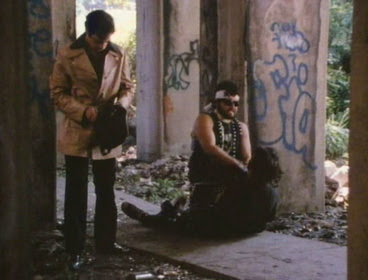To be overly reductive, Combat Shock is Taxi Driver meets Eraserhead meets Suicide's "Frankie Teardrop" on a Troma budget (Troma distributed the film but this is not a "Troma" film in sensibility), which is part of why I like it so much and part of why it's not something I recommend to casual acquaintances. It's a dirty, greasy, grimy, depressed bad trip shot in the butt-ugliest corners of early '80s Staten Island (possibly the least appealing locations ever captured on film), but writer/director/producer Buddy Giovinazzo has a strong visual point of view and knows how to execute it within his tiny budget, his brother Rick Giovinazzo, the star and composer of the score, intensely commits to the leading role while his music and surrealist nightmare electronic sound effects add so much to the film's atmosphere, and the vein of absurdist humor flowing through all but the darkest moments keeps the whole thing from being a depressing bummer.
Buddy G's first feature after several short films, Combat Shock is about Frankie Dunlan (Rick G), a Vietnam vet and POW with severe untreated PTSD (the film's first twenty minutes are a dreamlike version of his Vietnam experience) who has been out of work for four months. He has a pregnant wife who is sick of his shit, a mutant baby who makes electronic mewling sounds, a gambling debt past due with three local goons ready to collect on it, a down-and-out junkie friend who can't find a fix, a broken toilet, and a fridge that houses a single carton of expired milk. Frankie needs some money, and he needs it fast.
Frankie spends the day wandering the mostly abandoned wasteland of Combat Shock's version of Staten Island, the only New York City borough that voted for Trump, home to the city's garbage dumps, police officers, gangsters, and general meatheads who don't want anything to do with the rest of the city (a secession movement is popular locally)
That's only part of the story, of course. The arts community has been growing in Staten Island as creative types get priced out of the other boroughs, and there are plenty of visually appealing spots, museums, historic homes, etc. Combat Shock is not about that Staten Island. Giovinazzo found the ugliest, most beat down, least populated parts of the borough and set Frankie's life there. This is not 42nd street neon sleaze or mean streets grit or any other popular New York b-movie setting. This is pure dank outskirts-of-town ugliness.
A landscape of near-dilapidated apartments, train tracks, abandoned storefronts, empty warehouses, trash, dust, dirt, and the undersides of bridges with the only people a handful of junkies, crooks, sex workers, pimps, and victims, the world of Combat Shock is hopeless and dreary but also a little comical in the way no-hope can be oddly funny.
Frankie travels through the hellscape, having flashbacks to 'Nam, talking to a child forced into prostitution, taking a beating from the goons he owes money to, unsuccessfully attempting to talk his junkie friend out of robbing a woman (another junkie is played by one of my favorite comedians, Eddie Pepitone, in his first film role), and standing in line at the unemployment office.
Both the line and the office itself are great examples of the film's oddball sense of humor. The unemployment worker Frankie talks to (who, of course, has no work for him) has an office plastered with an odd assortment of posters, postcards, maps, and film stills, including a young Ted Kennedy, Frank Zappa sitting on a toilet, Dawn of the Dead, Klaatu from The Day the Earth Stood Still, and a swirling vortex, among hundreds of others. At some point, a longhaired stoner comes in and accuses the worker of using his Veg-O-Matic. This is the sensibility mainstream critics missed when they panned the film for taking itself too seriously.
After Frankie leaves the unemployment office, some really bad shit goes down, sending him into a downward spiral that is both disturbing and darkly funny. Giovinazzo, particularly in this final third, captures several memorable images and manages to wrangle his combination of social realism, exaggerated dark comedy, Vietnam movie, avant-garde experiment, grindhouse b-movie, and horror into a unified tone. Even on a second viewing, it retained its weird power.
Buddy Giovinazzo's next project after Combat Shock, a sequel to William Lustig's Maniac, fell apart after star and writer Joe Spinell died shortly after filming started, but he's managed to direct a handful of independent movies over the years, write a novel (Life Is Hot in Cracktown, which he also adapted into a film), teach filmmaking at NYU and the New York School of Visual Arts, and work extensively in German television. His most recent directorial credits include four episodes of the CW sci-fi series Pandora. Rick Giovinazzo never acted again after Combat Shock, but he's since become one of the most in-demand orchestrators in the movie business, arranging the scores for hundreds of big-budget Hollywood movies, and he's continued to compose the scores for most of his brother's films and a few of his television episodes.



.jpg)



.jpg)

.jpg)


No comments:
Post a Comment